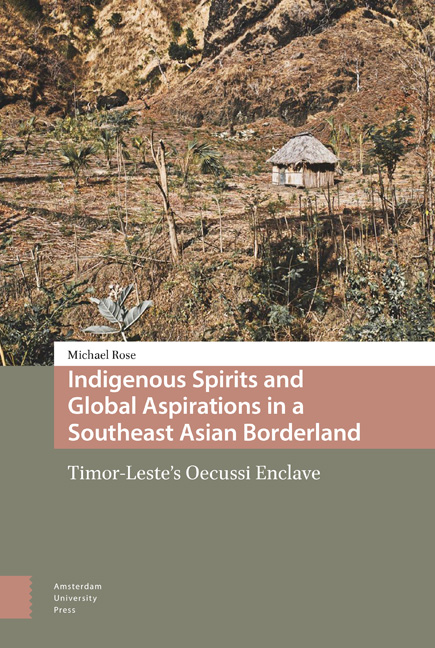 Indigenous Spirits and Global Aspirations in a Southeast Asian Borderland
Indigenous Spirits and Global Aspirations in a Southeast Asian Borderland Book contents
- Frontmatter
- Contents
- List of images
- Map
- A Note On Language
- Acknowledgements
- 1 Frontiers Imagined, Frontiers Observed
- 2 Body and Belief in Timor-Leste
- 3 The Ruin and Return of Markus Sulu
- 4 Angry Spirits in the Special Economic Zone
- 5 Stones, Saints and the ‘Sacred Family’
- 6 Meto Kingship and Environmental Governance
- 7 Ritual Speech and Education in Kutete
- Concluding Thoughts: Encounter, Change, Experience
- Selected Glossary
- Bibliography
- Index
- Miscellaneous Endmatter
5 - Stones, Saints and the ‘Sacred Family’
Published online by Cambridge University Press: 21 November 2020
- Frontmatter
- Contents
- List of images
- Map
- A Note On Language
- Acknowledgements
- 1 Frontiers Imagined, Frontiers Observed
- 2 Body and Belief in Timor-Leste
- 3 The Ruin and Return of Markus Sulu
- 4 Angry Spirits in the Special Economic Zone
- 5 Stones, Saints and the ‘Sacred Family’
- 6 Meto Kingship and Environmental Governance
- 7 Ritual Speech and Education in Kutete
- Concluding Thoughts: Encounter, Change, Experience
- Selected Glossary
- Bibliography
- Index
- Miscellaneous Endmatter
Summary
Abstract
While sick in Oecussi I also reached out to Oecussi's most famous Catholic ‘healer’, a man named Natar Nail Benu, known to all as Maun (Brother) Dan. Gently tolerant of (maybe even a little bemused by) my sinful nature, Maun Dan proved a sympathetic and patient friend, and took me under his wing, allowing me to spend time with him at his home and travel with him as he visited the many who called him in distress. In this chapter I explore how Maun Dan and his ‘Sacred Family’ move between meto and kase perspectives as they work to alleviate physical and emotional suffering in Oecussi in ways the central government is not able to facilitate.
Keywords: animism, syncretism, new religious movements, Catholicism
In the first chapter of this book I introduced the terms meto (indigenous/ familiar) and kase (foreign) and explained how in Oecussi these concepts are used to make sense of life. McWilliam (2007b), Richmond (2011, p 117) and Traube (2007) have noted how the advent of independence in Timor-Leste has facilitated the renewal of ritual practice as an organizing principle of public life, and spurred the emergence of new and distinctly Timorese ways of being modern. Building on their work I set out to show how experience in Oecussi is understood, not through a firm identification with either category, but in the work of ‘crossing’ between them, with outward-looking (kase) lifeworlds animated and made meaningful by ritually mediated engagement with a meto realm associated with all that is indigenous, invisible, and upland.
The understanding of kase and meto as co-present in daily life and decisive in its course, can be traced to resettlement of the rural population in periurban settlements that started in the 1970s. Before that time the terms were relatively simple categorical markers – kase folk could be reliably distinguished by wearing trousers, meto people always wore village woven beti (sarong). Now, even for those who remain in the hills, foreign ways (not to mention trousers) have become common, and the utility of kase and meto for describing two contrasting and sometimes oppositional modes of being (e.g. our grandfathers fought the kase) have been reduced.
- Type
- Chapter
- Information
- Indigenous Spirits and Global Aspirations in a Southeast Asian BorderlandTimor-Leste's Oecussi Enclave, pp. 137 - 166Publisher: Amsterdam University PressPrint publication year: 2020


